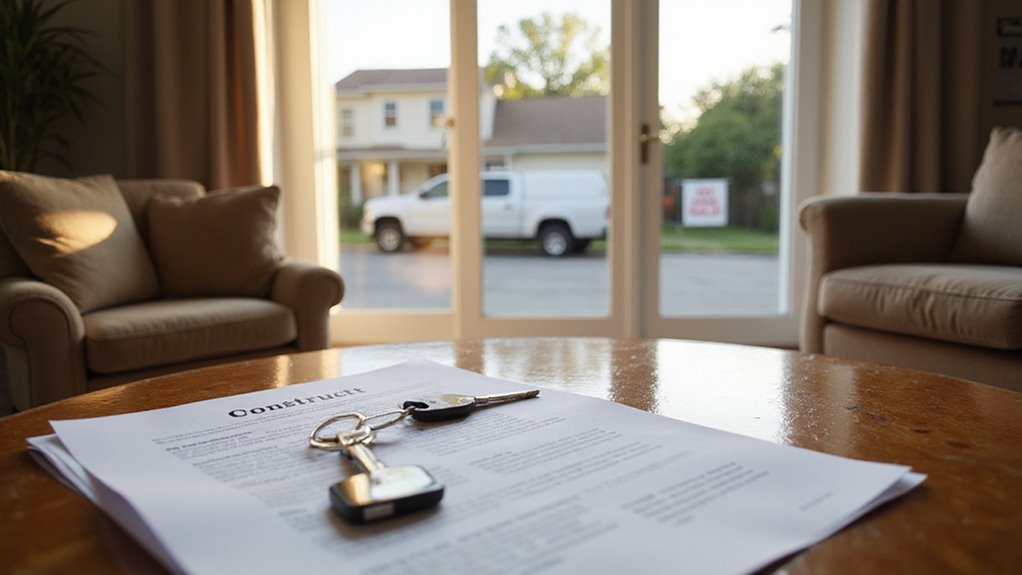Relocating brings many big decisions. One of the hardest is choosing whether to sell or rent your home. This choice can impact your finances and future plans for years.
Making the wrong move can lead to regrets. You might lose out on potential profits or face unexpected landlord headaches. Worrying about market changes or missed opportunities can add stress to your move.
If your goal is long-term financial growth and flexibility, renting is usually the better choice when relocating. Selling may provide quick cash, but renting can offer steady income and future options.
The best path depends on your personal situation and goals. This blog will guide you through the selling versus renting decision and help you choose the right option for your move.
Key Takeaways
- Compare potential rental income to ownership costs and local sale prices to determine which option offers higher financial returns.
- Assess local market trends, such as home value appreciation and rental demand, to gauge future profitability.
- Consider long-term plans—if you may return, renting maintains flexibility; if relocating permanently, selling may simplify your finances.
- Factor in legal, tax, and management responsibilities, including landlord-tenant laws, property upkeep, and possible capital gains taxes.
- Weigh emotional ties to the property, as sentiment can influence your willingness to sell or rent.
Evaluating Your Financial Situation

Before you decide to sell or rent your home, check your overall financial situation. Start by listing your mortgage balance, monthly costs, and expected rental income or sale price. This helps you see what makes the most sense for your money.
Reviewing recent sales and property trends in your area can also help you gauge the local market and make a more informed decision. Assess your finances by listing your mortgage, monthly costs, and potential income before choosing to sell or rent your home.
Include any recent renovation costs in your calculations. These upgrades can raise your home’s value but may take time to pay off. If your home is in a safer area, it may attract better tenants or higher offers.
Think about who will handle property management and repairs if you rent. If you are not able to manage the property, consider the cost of hiring help. Also, remember to check the tax effects for both selling and renting.
If you look at all these numbers, you can make a smart choice. This approach can help you reach your financial goals and avoid problems during your move. If considering selling without repairs, remember that selling as-is can expedite the process but may result in a lower sale price and a limited pool of buyers.
Analyzing Current Real Estate Market Trends
You need to weigh recent home price appreciation rates alongside shifts in rental demand to make an informed decision. National data shows some markets are cooling while others see robust growth, directly impacting your potential returns. By tracking these trends, you’ll position yourself to maximize value whether you choose to sell or rent.
Additionally, considering how local real estate trends influence buyer and renter demand can help you better anticipate which option will yield the greatest advantage in your specific area. Sellers should also monitor housing inventory as it plays a crucial role in determining both selling prices and rental rates.
Home Price Appreciation Rates
Home price appreciation rates are changing in many areas. Some places are seeing slower growth, while others are still rising. It is important to know how your local market is performing.
Major cities now have annual appreciation rates between 3% and 5%. Suburban and smaller markets often see higher gains, ranging from 6% to 8%. If you own a renovated home in a popular neighborhood, you could get more than the average price.
Some regions are now seeing home prices drop after periods of fast growth. Careful analysis of your neighborhood can help you predict future trends. If you plan to sell or rent, always check local data before making decisions.
Rental Demand Shifts
Rental demand is changing in both cities and suburbs. People now care more about safety and good schools when choosing rentals. Properties in safe areas or near top schools attract steady, long-term tenants.
The National Multifamily Housing Council reports an 18% rise in rental applications for these areas. If your property is in a safe neighborhood or quality school district, you may see higher demand.
Urban areas are seeing mixed demand because some renters want more space and lower costs. Suburban areas are gaining interest as a result. If you study these trends, you can decide whether to rent or sell your property based on its location.
Estimating Potential Rental Income

Estimating potential rental income means checking what similar homes in your area rent for. You should not rely on guesses or outdated numbers. Accurate research helps set the right rent. Compare your property with at least three recent rentals nearby. If your home has better features, you may charge more. Features like new appliances, parking, or a yard can raise the value. Check how many rentals are available in your area. If many homes are vacant, you may need to lower your price. Rental demand changes with the seasons, so consider timing. Calculate both your total and net income.
Always subtract costs like management fees and times when the property is empty. These steps ensure your rental income estimate is realistic. Paying close attention to the condition of your house is also important, since needed repairs or upgrades can affect both the rent you can charge and tenant interest. When estimating rental income, it’s also important to consider factors like marketable title to ensure your property remains attractive and free of legal complications for potential tenants.
Understanding Tax Implications
Tax implications are important when choosing to rent or sell your property. Renting allows you to claim tax deductions for mortgage interest, property taxes, repairs, and depreciation. These deductions can lower your taxable rental income. If you sell after renting, you might owe capital gains tax. Selling the property could also make you ineligible for the primary residence exclusion.
This exclusion lets you avoid taxes on up to $250,000 ($500,000 for married couples) of profit. Consider these tax rules before deciding. Before selling, make sure you have clear title to help ensure a smooth transaction and avoid legal complications. The final financial outcome depends on how these taxes affect your situation. If unsure, you should consult a tax professional.
If you inherit a property, the step-up in basis can significantly reduce or even eliminate potential capital gains taxes when you decide to sell.
Considering Property Management Options

As you weigh your options, consider whether you’ll hire a professional management company or handle the rental yourself. Industry data shows that professional managers typically charge 8-12% of monthly rent but can reduce vacancy rates and legal risks. If you choose to self-manage, you’ll retain more income but must be prepared for hands-on maintenance, tenant screening, and compliance responsibilities.
If your need for cash is urgent, selling to a cash buyer could be a faster and more straightforward solution than managing a rental property. Another benefit of selling to a cash buyer is the speed of sale, which can provide you with funds quickly and minimize the stress of a drawn-out transaction.
Choosing Professional Management Companies
A professional management company can take care of your property for you. This is helpful if you are moving away. Such companies use their experience to keep your property safe and profitable.
Professional managers can set the right rent price. If you want fewer problems, they will screen tenants carefully. They also handle rent collection and keep financial records clear.
They will fix problems quickly and manage emergencies. If you want to avoid legal trouble, they follow all property rules. With professional help, your property stays in good shape and earns steady income.
If you are relocating, a management company can save you time and worry. Your property will be watched and maintained. You can focus on your move while experts handle everything else.
Self-Managing Rental Properties
Self-managing rental properties means the owner handles all tasks instead of hiring a property manager. Owners do this to save money and have more control. They also take care of tenant issues and property upkeep themselves.
Owners can save up to 10% of annual rent by avoiding management fees. This choice requires learning local laws and handling emergencies. If you are willing to learn, you may increase your profits.
Knowing your target renters helps you set the right rent and market your property well. Owners who pay attention to details often succeed. If you stay organized and proactive, self-management can be rewarding.
Assessing Your Long-Term Plans
Before you choose to sell or rent your property, think about your long-term plans. Decide if you might return or if you are moving for good. Your answer will guide your next steps. Consider your long-term plans before deciding whether to sell or rent your property—your future intentions will shape the best choice.
Homeowners with clear goals often make better decisions. If you plan to return soon, renting may be best. If you are leaving for good, selling could make more sense. If you do choose to sell, be prepared to complete required disclosure forms to inform buyers about the condition of your home.
Your property is part of your investment plan. Consider if you need cash now or want steady rental income. If local prices are rising, holding onto the property might help you build wealth.
Check the tax effects of each option. Tax rules for selling and renting can be very different. You should also be aware of any emotional ties that could affect your decision.
If your property has any real estate liens, it’s important to understand how these can impact your ability to sell or rent, and what steps you may need to take to resolve them before making your final choice.
Weighing Emotional Attachments

Emotional attachments can strongly affect your choice to sell or rent your home. If you feel connected to your property, this can make decisions harder. Sentimental value often plays a big role, even if the financial option seems clear. A 2023 Zillow survey found that nearly 70% of homeowners let emotions guide their housing choices. If you have memories tied to the home, selling may feel difficult. Renting could let you keep these connections but may slow your adjustment to a new place.
For homeowners seeking a smoother transition, working with cash home buyers can make the selling process quicker and less stressful. You should consider if your emotional attachment supports your current goals. If it holds you back, it might impact your future well-being. Weigh these feelings carefully before making your final choice. In situations where emotional stress becomes overwhelming, seeking relief through a stress-free solution—such as a cash sale—can help homeowners move forward.
Factoring in Maintenance Responsibilities
When you rent out your property, you’re responsible for ongoing upkeep and must be prepared to address emergency repairs quickly, regardless of where you live. According to industry surveys, landlords spend an average of 1-4% of a property’s value on annual maintenance. Before deciding, weigh whether you’re willing and able to manage these responsibilities from afar. If you choose to sell instead, consider the finalizing the sale process, which includes negotiating with buyers, completing paperwork, and ensuring a smooth transfer of ownership.
Ongoing Property Upkeep
Renting out your property means you must handle regular maintenance. Landlords often spend 1%–4% of their property’s value on upkeep each year. If you own a rental, you need to manage both small and big repairs.
Routine tasks include arranging lawn care, cleaning gutters, and fixing leaks. If you skip these jobs, your property might lose value or attract fewer tenants. Regular attention to both inside and outside spaces is important.
You should schedule yearly inspections to catch problems early. Appliances may need servicing, and worn-out parts should be repaired quickly. If you want to avoid fines, always follow local safety and property rules.
If you plan renovations, your property can stay competitive in the market. Good maintenance keeps your property valuable and your tenants happy. Staying on top of these tasks protects your investment.
Handling Emergency Repairs
Emergency repairs require quick action from landlords. These repairs include burst pipes, broken heaters, or electrical failures. If you respond slowly, tenants may become unhappy or even take legal action.
Regular property inspections help you catch small problems early. If you inspect often, you can prevent many emergencies. Having trusted contractors ready makes it easier to fix urgent issues fast.
Unexpected repair costs are a common challenge for landlords. If you set aside emergency funds, you can handle repairs without stress. Good planning keeps your rental property safe and valuable.
Gauging Local Rental Demand

Local rental demand changes by neighborhood and season. You should review data before renting out your property. Accurate research helps you make a good decision.
Start with a local market analysis. Look at recent trends and check if new projects may affect demand. Use city housing reports and trusted real estate websites for information.
If vacancy rates are low, demand is likely strong. You should also compare how long similar rentals stay available. If rentals fill fast, you may earn more income.
Employment trends and population growth can affect rental demand. If job numbers or population rise, more people may need housing. Seasonal changes may also impact demand in your area.
You should check for new housing projects or zoning changes nearby. If new homes are being built, competition could increase. Reliable data helps you choose wisely and earn more.
Calculating the Costs of Selling
Selling a property comes with several costs you should know about. These costs will affect your final profit. Understanding them helps you plan better.
You must begin with a market analysis to estimate your home’s sale price. Subtract all selling expenses from this price to see your potential profit. If you want a good estimate, use recent sales of similar homes.
Typical costs include agent commissions, which are usually 5-6%. Closing costs can range from 1-3% of the sale price. You may also need to pay for repairs or home staging.
If you have a mortgage, check if there are any payoff penalties. Moving expenses and buyer concessions may also apply. If you sell for a large profit, you might owe capital gains tax.
Listing each cost next to your expected sale price can help avoid surprises. If market conditions change, your net proceeds may be different. Careful planning will help you understand what to expect when selling.
Reviewing Legal and Regulatory Requirements
You need to understand how landlord-tenant laws in your area set clear expectations and responsibilities when renting out your property. Tax implications also play a major role—data shows that rental income, capital gains, and possible deductions can significantly affect your financial outcome. Before making a decision, review these legal and regulatory requirements to avoid costly surprises.
Landlord-Tenant Law Overview
Landlord-tenant law covers the rules for renting property. These laws differ by state and city. Landlords must follow these rules to avoid legal problems.
A lease must follow state laws to be valid. If leases are not correct, landlords may face lawsuits. Industry data shows many landlord disputes start with bad leases.
Fair housing laws protect renters from unfair treatment. Landlords should learn these laws to avoid discrimination claims. Mistakes here can lead to fines or lawsuits.
Eviction rules are strict and must be followed exactly. If a landlord skips steps, the eviction can be delayed for months. Proper notice and paperwork are required.
Security deposit laws control how much landlords can collect and when to return it. Breaking these rules may result in financial penalties. Each area can have its own deposit laws.
Maintenance laws require landlords to fix problems quickly. If repairs are ignored, tenants can report landlords or withhold rent. Keeping the property safe helps avoid legal trouble.
Staying informed about current laws can prevent disputes. If landlords follow the rules, they can protect their income and rental property.
Tax Implications Explained
Tax rules can affect your decision to sell or rent your property. If you sell your main home, you might not pay tax on up to $250,000 of profit if you are single, or $500,000 if married. You must have lived in the home for two out of the last five years to qualify for this rule.
If the market goes down, your sale price and possible taxes could change. Renting your property brings its own tax effects. You must pay tax on rent you receive.
Owners can lower their taxable income by deducting costs like mortgage interest, property taxes, repairs, and depreciation. These deductions can help balance out your rental income. If you earn more from renting, your total income could rise and put you in a higher tax bracket.
Tax laws often change, and every situation is different. You should talk to a tax professional before making a final decision. This can help you choose the best option for your finances.
Exploring Alternative Investment Opportunities
Alternative investments can help grow your money outside of traditional real estate. Shifting your equity from property to other assets may offer higher returns. If you want to reduce risk, diversifying your portfolio is a smart choice.
You could invest in index funds or ETFs for broad market coverage and easy access to your money. REITs allow you to keep exposure to real estate without owning property directly. High-yield bonds are an option if you need regular income.
Private equity or venture capital may suit those willing to accept higher risks for potentially greater rewards. International investments can help protect against changes in your home market. If you consider these alternatives, you may achieve better growth and more stability.
Preparing Your Home for Sale or Rent
Before selling or renting your home, make improvements that increase its appeal and value. Strong curb appeal can help you get up to 7% more money. Landscaping, painting the front door, and cleaning walkways will help your home look inviting.
Home staging is important if you want to sell or rent quickly. Professionally staged homes often spend less time on the market. You should declutter, use neutral paint colors, and arrange furniture to show off the space.
If you fix small problems, your home will look move-in ready. Repair leaky faucets, squeaky doors, and scuffed floors. These steps can attract more buyers or quality tenants.
Making a Decision That Fits Your Lifestyle
Your choice should match your long-term goals and everyday needs. If you value change or want to invest elsewhere, selling may suit you. Renting may fit better if you want flexibility or plan to return. Choose the option that aligns with your future plans—sell for new opportunities or rent for flexibility and the possibility to return.
Consider where you will live and how close it is to work or schools. If you rent, you must have time to manage the property. You should also think about safety and community in both locations.
If the real estate market is unstable, selling might carry more risk. Emotional ties to your home can also affect your decision. Each factor can help you choose the best option for your lifestyle.
Conclusion
If you are deciding whether to sell or rent your home, consider your financial situation and future plans. If you need quick cash or want to avoid landlord duties, selling may be best. If the market is strong and you want steady income, renting could work well.
If you choose to sell, Greg Buys Houses can help. We buy houses for cash and make the process simple and stress-free. If you want to skip repairs or showings, we offer a fast solution.
If you are ready to make a decision, reach out to us today. We can answer your questions and guide you through your options. Let Greg Buys Houses help you move forward with confidence.

